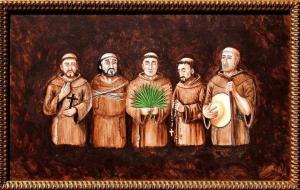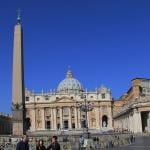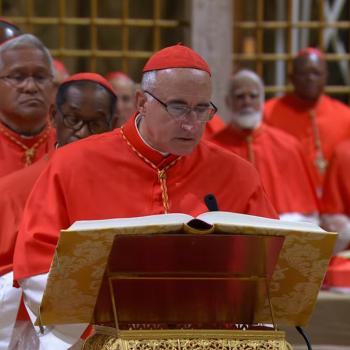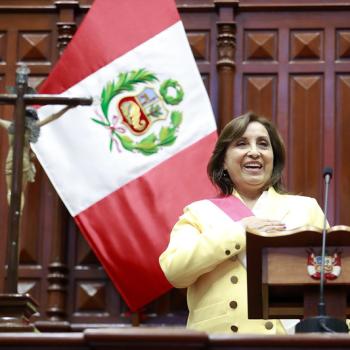I delivered this homily at Nativity of Our Lady Catholic Church in Darien, Georgia for the 422th anniversary of the death of the Servant of God Friar Pedro de Corpa and Companions.
I have always thought that if God chose and called Saint Paul to play a foundational role in the early Church, God can definitely choose and call whoever he wishes to do whatever he needs to get done.
Paul was not seeking Jesus, but was killing his disciples.
He was not curious about the so-called Messiah, but was passionately crushing his message and memory.
A powerful encounter with Jesus on the road to Damascus transformed Paul, allowing him to write years later in his letter to Timothy: “I am grateful to him who has strengthened me, Christ Jesus our Lord, because he considered me trustworthy in appointing me to the ministry.”
Paul truly meant what he wrote. Everything he accomplished in spreading the Gospel was done through the grace of God – with Jesus strengthening him and directing him.
“I was once a blasphemer and a persecutor and arrogant, but I have been mercifully treated because I acted out of ignorance in my unbelief.”
Saint Paul may be the first flesh-and-bone example of Jesus’ well-known parable of the Prodigal Son. In his own words: “Christ Jesus came into the world to save sinners. Of these I am the foremost.” Paul is the lost sheep, the lost coin, and the lost son.
Paul’s zeal for the Gospel led to his death in Rome in 67AD during the persecution of Christians under Emperor Nero. He became one of thousands who gave the ultimate witness to the Gospel by conforming their lives perfectly to the life of Christ. The early Church praised martyrdom because of all the ways a Christian could become more Christ-like, a death like his was on the top of the list.
The early Christian martyrs witnessed to their faith in Christ with fervent and passionate conviction. There was no room for complacency or indifference. Martyrdom was a special grace given to them.
In the very early 300s, a bishop in Egypt was brought to trial, his name was Phileas. After being threatened with a gruesome death, the Roman prefect asked him, ““Do you wish to die in this way, to no purpose?” to which the bishop answered quickly and bravely, “No, not to no purpose, but for God and for the truth.” The martyrs throughout the centuries have died for God and for the truth.
The same grace from Christ that motivated and strengthened Saint Paul to dedicate his life to the Gospel motivated five young, passionate Franciscan friars in Spain to volunteer to share the Gospel with newly discovered peoples in faraway lands. Like Saint Paul, friars Pedro, Blas, Miguel, Antonio and Francisco left behind the comforts of home and set out in a journey where Jesus transformed them and strengthened them to the point of death for the sake of the Gospel.
The same grace from Christ that allowed Saint Paul and Saint Phileas to persevere to the end and die as martyrs, strengthened the friars 422 years ago, allowing them to remain steadfast in their mission to share the Gospel with the native Guale people of Georgia.
We remember their witness to Christian marriage and their heroic sacrifice that conformed them perfectly to Jesus Christ through a death like his. We pray for their cause for beatification, that the universal Church may officially recognize them as martyrs and blessed among the saints.
Friar Pedro de Corpa from Castile volunteered in 1587 along with 11 friars to come here, to the northernmost province of the Spanish Empire in the New World, La Florida. After a stopover in La Havana, Cuba, he arrived to Saint Augustine. Pedro worked there until more friars arrived, freeing him to move further north to evangelize the Guale natives. We do not know for certain when he was sent to the Mission of Tolomato a few miles north of Darien, Georgia. Tolomato was the main city of the Guale, and its chief was considered the main or principal one among the Guale.
Pedro was a zealous missionary, quickly learning the local language and baptizing many.
A poem written in the early 1600s described Friar Pedro emphasizing his life of poverty, chastity and obedience. The author wrote: “I and the people who accompanied him to the land where we lived together are witnesses of his sanctity. Poverty was his favorite virtue. He admired the chaste and holy angelic choir and he was submissive to his bishop or superior, always demonstrating his obedience by quickly obeying all orders. Being a wise and holy man, the love of God burned in his heart, and by means of prayer, abstinence and self-discipline he gave good example to the Indians of the West (New World) whom he strove to convert.”
When Juanillo, a baptized Christian who was the heir to the chiefdom of Tolomato took a second wife, Friar Pedro admonished Juanillo to adhere to the marriage promises he had made as a baptized Christian. The friar also made known his opposition to Juanillo’s succession as chief due to this situation – an announcement that angered the authorities in Saint Augustine.
Pedro’s defense of the sacrament of marriage led to the organization of a war party by Juanillo. After killing Pedro in Tolomato, the men continued to the mission of Tupiqui a bit further north where Friar Blas was killed.
Juanillo’s war party continued to Saint Catherines Island where Friars Miguel and Antonio worked. The local chief of Saint Catherines begged the two friars to escape before Juanillo arrived. The friars chose to stay dismissing the reports of executions as rumors. They did not want to abandon their people. Both were killed outside the friary.
Friar Francisco was killed as he returned by canoe from Saint Augustine with supplies.
A sixth friar, Francisco de Avila, was held captive for several months and eventually released. He refused to testify for fear of what the government officials in Saint Augustine would do to the natives.
Friar Pedro de Corpa and his companions died as martyrs, witnesses to the indissolubility and permanence of the sacrament of marriage. At a time when society’s understanding of marriage and family has rapidly broken down, we need more than ever before the prayers and intercession of these men. Saint John Paul II pointed out that “[Some families] have become uncertain and bewildered over their role or even doubtful and almost unaware of the ultimate meaning and truth of conjugal and family life.”
The Venerable Pedro de Corpa and his Companions may be martyrs of the 16th century, but their witness is timeless, and is necessary today. It is as timeless and as necessary as the witness of Saint Paul, and the countless martyrs of the early Church.
The strength from Christ the friars received four hundred years ago continues to resound today, and it is our duty to make it known.
May their memory be eternal. Amen.













